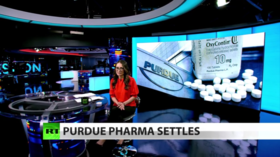I lost multiple friends to opioids, and the deaths won’t stop while the system creates crises to sell ‘solutions’

Purdue Pharma, the maker of OxyContin, is pleading guilty to charges related to its role in the opioid epidemic that has killed over 400,000 Americans. But a single cause celebre won’t reverse the spiral of despair that causes it.
American communities are being ravaged by so-called “deaths of despair” as the life expectancy of Americans is beginning to drop. Young people are seeing their friends fall out and die around them; those shining few among them that angrily screamed the anthems of the so-called end of history – Nirvana’s Kurt Cobain, for one famous example – are dead from their own despair just like the others they knew. Growing up and spending most of my life in Kentucky, I’ve experienced this despair firsthand and seen its effects.
I remember where I was when I got the call that my best friend in the world, Nick, passed away. Nick fought a long battle with heroin addiction; it seemed he was just about to win, but succumbed right at that critical juncture after he was released from a court-ordered rehabilitation program. I can still feel these moments so deeply and they’ve changed everything for me, making me realize how fleeting life really is. Nick left us at the age of 21.
This wasn’t the first time I had to deal with this kind of situation, but it certainly was the closest one. In high school, a friend of mine, Johnny, was killed by a drunk driver after leaving a party some friends and I had organized. Nick was one of those friends that was there and he was standing next to Johnny when he was struck and killed. He was only 18.
A year before Nick died, another friend from my high school who graduated a few years ahead, Corey, was gunned down in Cincinnati. He was apparently on a heroin binge and tried to rob a dealer because he didn’t have enough money. Trying to seek help after being shot, he drove to a bank and frantically banged on the door. He died at the age of 22 in the arms of the friend who was with him, Jacob, before help could arrive.
Jacob himself died soon after from a heroin overdose only six days before his 21st birthday. According to some friends, the person who was with him at the time didn’t call the police out of fear of criminal charges. That person is now in an assisted living home at the age of 26 after suffering brain damage from a heroin overdose, they say.
Another family friend, Derek, died at the age of 19. According to what I know, he had been facing a charge for possession of heroin. As an immigrant living as a dependent under his father, who was in the country on a work visa, this may have caused some immigration-related problems with himself or his family so he took his own life.
There are many more examples I could list, but these are the victims of America’s despair I knew the closest. One common theme between all of these young men was a similar disadvantaged economic situation, and it’s no coincidence. As was seen in the crack epidemic of the 1980s and 90s that affected Black communities, unemployment rates prior to it were high and only rising – influenced by a departure of manufacturing jobs that first hit black workers, the last hired and the first fired.
Also on rt.com DOJ charges hundreds doctors & nurses in massive $6bn ‘healthcare fraud’ and opioid bustNow that lack of prosperity has begun to hit white communities, particularly in the “Rust Belt” and in rural communities. According to statistics, drug abuse rates are higher among unemployed workers, which hits the chronically unemployed or underemployed even harder – and to be sure, even under Trump’s “greatest economy in the world” there were many of these people.
As I summarized the link between neoliberal economic policies that result in endemic inequality and drug addiction in a 2017 piece,“In short, drug addiction is much easier to fall into and stay in if you are poor.” It doesn’t take much thought to imagine why this is if one is willing to dismiss the attractive but false (and perhaps uniquely American) notion that personal choice is the key differentiating factor for addiction.
The COVID-19 pandemic is only going to drive more people into drug addiction as the cascading economic effects, which we are surely not seeing in full at this time, make life more insecure for more people. We are actually already seeing an uptick in opioid and other drug-related overdoses during the pandemic; it’s widely understood that it’s because people are depressed or feel trapped, but now imagine that poverty is a trap with similar deleterious mental health effects – because it definitely is.
The problem of inequality exacerbated by neoliberal economics harms young people through its systematic destruction of working class prosperity and breaking of the social democratic consensus in the West, and certainly the United States is the worst case of this.
Other well-developed countries are dealing with similar issues of addiction and mental health; for example, the United Kingdom is seeing increased drug use among young people. According to the latest report on this data, in 2018, 38% of 15 year olds in England, and 21% of 15 year olds in Scotland, said that they had used drugs.
There is also the fact that our entire economic system works in a way that is not conducive to solving mental health issues. Even over-40s and older people are experiencing these deaths of despair, and this due to a common theme related to the opioid epidemic – people get hurt, get pushed painkiller drugs and then get hooked.
Purdue Pharma, the maker of the powerful painkiller, OxyContin, will plead guilty to three federal charges and will be put out of business for its role in driving the opioid epidemic, the US Department of Justice announced on Wednesday. The company admits in its plea that it “knowingly and intentionally conspired and agreed with others to aid and abet” the dispensing of medication from doctors “without a legitimate medical purpose and outside the usual course of professional practice.”
Even though Purdue will be morphed into a “public benefit company” to continue to “ethically” produce these same drugs, no one is likely to pay the multi-billion dollar fine levied and no one is going to end up behind bars. It is a pure facade of justice. But even if it's just a show, it would have merely scratched the surface in the first place. The fact is that the way we frame health, mental or otherwise, in the country is all wrong.
We have an economic system that creates problems and sells the so-called solutions to those problems for a profit, reinforcing them without actually solving them. Note that drugs used in opioid addiction treatment, such as methadone, are produced by Big Pharma and Purdue themselves planned on double-dipping into the crisis they helped create by getting into the addiction recovery game.
Also on rt.com US states seek BILLIONS from drug ‘KINGPIN’ Johnson & Johnson and its distributors for causing opioid crisisFurther evidence that it is indeed our economic system creating this problem can be seen in former Eastern bloc countries and the fact that drug use and drug overdoses boomed after the fall of the USSR in the nineties. With neoliberal capitalism and its corresponding plunder of public coffers and social safety nets came unrelenting despair. A reverse situation played out in China; millions upon millions of Chinese adults were addicted to opium prior to the Chinese Revolution and now addiction has been largely eradicated.
As Mark Fisher describes the issue of mental health in his famous “Capitalist Realism,” young people in the West are now living in what is seen by the ruling class as the “end of history.” Capitalism in its neoliberal form has conquered all around it and made capitalist ideology so ubiquitous that “there is no alternative,” as Margaret Thatcher famously said. The good guys won the Cold War, we’re told, we can live with freedom, choose our own destiny and make our own way in life.
But this capitalist realism is more utopian than any alternative could be; it will be extremely difficult to maintain this economic status quo as tens of millions go jobless or even homeless, and many households struggle to merely put food on the table. With this inequality only deepening to historic levels during a time of unprecedented turmoil, we may not be at the end of our ideological history, as Francis Fukuyama famously asserted, but only just turning to the next chapter as this despair morphs into anger and resentment.
Think your friends would be interested? Share this story!
The statements, views and opinions expressed in this column are solely those of the author and do not necessarily represent those of RT.
















